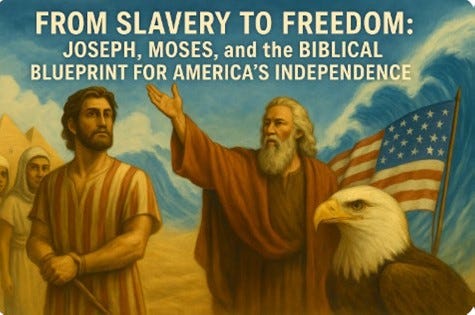From Slavery to Freedom: Oppression, Suffering, Leadership, Deliverance By Major Mike Gary, Chairman of Medicine and Ministry, Truth for Health Foundation
The story of Joseph (Genesis 37–50) begins with betrayal and enslavement. Joseph, Jacob’s favored son, was sold into Egyptian slavery by his envious brothers (Genesis 37:28). Though falsely accused and imprisoned, he remained faithful. God eventually elevated him to lead Egypt’s famine response. In the end, Joseph forgave his brothers, saying: “You meant evil against me, but God meant it for good” (Genesis 50:20). His journey from captivity to governance marks the transformative power of suffering shaped by Divine Providence.
The theme of slavery and ultimate redemption carries into Exodus: a new Pharaoh enslaves Joseph’s descendants. God calls Moses to free His people: Then the Lord said to Moses, "Go to Pharaoh and say to him, 'This is what the Lord says: Let my people go, so that they may worship me.'"
(Exodus 8:1). Through plagues, miracles, the parting of the Red Sea, Moses leads Israel out of bondage oward covenantal law and national identity. This event becomes the archetypal liberation story—central to Jewish faith with echoes in American political thought.
The founding generation of America viewed their revolution in deeply biblical terms. From the Declaration onward, they saw themselves as a new Israel, oppressed yet divinely led toward freedom. As recounted by Bruce Feiler, early proposals for the Great Seal invoked the image of Moses parting the Red Sea. Benjamin Franklin and Thomas Jefferson both suggested Moses as central to the seal’s imagery. The design ultimately adopted in 1782 featured on its reverse side: the plagues, the Red Sea crossing, and divine providence symbolized by the Eye atop a pyramid—strong references to God’s intervention and the Exodus narrative.
But American identity went beyond selective symbolism—the founders embedded Christian moral principles into the nation’s legal and political ethos. According to American Mind, Justice Joseph Story observed that nearly every American colony, from its founding to the Revolution, supported Christianity through laws and institutions; public Christianity was not just tolerated, but integrated into public life and identity.
Justice Story argued that the First Amendment was never meant to exclude Christianity entirely; it aimed to prevent denominational establishments while still allowing Christianity to receive encouragement so long as religious liberty was preserved americanmind.org+1apnews.com. In this worldview, Providence was not abstract philosophy, but a lived conviction. The Declaration speaks of “unalienable Rights … endowed by the Creator,” and the signers pledged reliance on divine protection for their cause. As American Mind has emphasized, the Revolution was understood as a providential mission—"a divinely guided effort to establish a nation under God" .
When paired with the narratives of Joseph and Moses, a deeper theological pattern emerges: oppression, suffering, leadership, and deliverance. Joseph’s personal trials prepared him for leadership; Moses’s confrontation with Pharaoh set his people free. Likewise, the founders saw adversity under British tyranny refining their resolve. They believed liberty required moral grounding. As Thomas Jefferson notably asserted, national freedom could only rest upon belief in God as the giver of rights—an idea echoing the biblical covenant tradition .
Putting it all together: America’s journey from colonial bondage to independent nationhood was framed biblically. Joseph’s wrongful sale into slavery prefigures America’s subjection to British rule. Moses’s deliverance through divine power echoes America’s rise to sovereignty. The Great Seal’s parting‑sea imagery, along with the persistent role of Christianity in public identity from colonization to independence, all testify that America’s founding was culturally and spiritually linked to biblical freedom narratives.
Thus, the interplay of Joseph’s forgiveness, Moses’s leadership, and the founders’ covenantal vision reveals a narrative arc: slavery transformed into purpose, oppression turned to liberation, faith guiding nationhood. In your devotional material, these connections reinforce how God can use trials to elevate leaders, how divine deliverance leads to national destiny, and how America’s own conception of freedom was shaped by biblical understanding of covenant, law, and Providence.
The Apostle Paul reminded early Christians to remain in the freedom Christ provides, which our Founders clearly understood as they wrote America’s foundational documents:
It is for freedom that Christ has set us free. Stand firm, then, and do not let yourselves be burdened again by a yoke of slavery. Galatians 5:1
Discussion about this post
No posts





You didnt mention the Native American Genocide